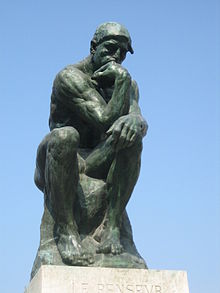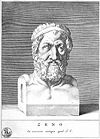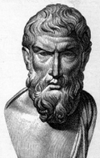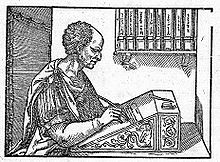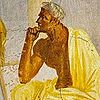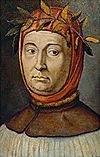- Otium
-
Otium, a Latin abstract term, has a variety of meanings, including leisure time in which a person can enjoy eating, playing, resting, contemplation and academic endeavors. It sometimes, but not always, relates to a time in a person's retirement after previous service to the public or private sector, opposing "active public life". Otium can be a temporary time of leisure, that is sporadic. It can have intellectual, virtuous, or immoral implications. It originally had the idea of withdrawing from one's daily business (negotium) or affairs to engage in activities that were considered to be artistically valuable or enlightening (i.e. speaking, writing, philosophy). It had particular meaning to businessmen, diplomats, philosophers, and poets.[1][2]
Contents
Early and classical Latin
A key concept for Latin civilization is otium, opposite of negotium.[3] The word is ambiguous.[4] It is defined as leisure, vacant time, and freedom from business. It also can mean free time, ease, peace, or repose; the adjective otiosus means "idle, leisured, on the cessation of war: peaceful", with the adverb otiose.[5] Aulus Gellius, while discussing the word praeterpropter ("more or less") quotes a fragment of Ennius's Iphigenia, which contrasts otium with negotium repeatedly.[A]
In early and colloquial Latin, despite the etymological contrast, otium is often used pejoratively, in contrast rather to officium, "office, duty" than to negotium; Cato the Elder, the moralist, writes extensively against otium as wasted time. Cicero uses the word often, in this negative sense, in the neutral to positive sense of "peace and quiet", and in a positive sense, since often repeated, of literary leisure; he describes his involuntary retirement from public life under the First Triumvirate as otium, giving it the poistive spin of the Greek σχολή, schole, "leisure," the desirable state of Greek philosophers.[6]
The ancient Greek term for "free time" was schole. Its meaning of "free time" becomes more sophisticated[7] with the writings of Plato and Aristotle, the use of which becomes a specific time of learning. The Romans therefore used two terms when translating the separate meanings of the single Greek word schole. Otium was defined as "empty" or "vacant" for that of "free time" and ultimately meant "leisure time". The single Greek word schole had a learning meaning association termed schola, which ultimately meant "leisure activity" (school).[7]
Philosophical uses
Greek philosophers
Aristotle distinguished intellectual or contemplative leisure, which is valuable in itself, and can form a more useful citizen, from idle amusement.[1] Theophrastus and Dicaearchus, students of Aristotle, debated much on the contemplative life and the active life.[8]
Zeno of Citium, the founder of the school of Stoic philosophy, taught that unless impeded, the wise person should participate in an active public life (i.e., politics). The Stoic idea of otium is that the wise person could never be prevented from an active life in the state of the universe, even though he may be precluded in the state of Rome. He could still fulfill his Roman obligations therefore by serving all of mankind—a type of dual citizenship (Roman citizenship and universe citizenship) that followed Zeno's doctrine of his Politeia. A wise person then could achieve liberty and happiness through personal tranquility.[9]
Epicurus's philosophy was contrary to Hellenistic Stoicism. Epicurus promised enjoyment in retirement as a concept of otium.[10] The concept of the Epicurean otium (private world of leisure) and the contemplative life were represented in Epicurus' school of philosophy and his Garden. The portraits of the Garden of Epicurus near Athens represented political and cultural heroes of the time. Twenty-first–century historians Gregory Warden and David Romano have argued that the layout of the sculptures in "The Garden" were designed to give the viewer contrasting viewpoints of the Epicurean otium and the Hellenistic Stoic viewpoint of otium (i.e. private or public; contemplation or "employment"; otium or negotium).[11]
A Epicurean proverb
“ It is better to lie on the naked ground and be at ease, than to have a golden coach and a rich table and be worried.[12]
” The phrase "to be at ease" can have the meaning "to be of good cheer" or "to be without fear" — these being interdependent. The Epicurean idea of otium favors contemplation, compassion, gratitude and friendship. The Epicurean view is that wisdom has as much to contribute to the benefit of the public as does that of contributions of politicians and laborers (i.e. sailors). The rustic otium concept incorporates country living into Epicureanism. The active city public life of otium and a reserved country life of reflection have been much written about by Cicero and Seneca the Younger.[13]
Roman Republic
Titus Maccius Plautus in his play Mercator says that while you are young is the time to save up for your retirement otium so you can enjoy it later, in his claim tum in otium te conloces, dum potes, ames (then you may set yourself at your ease; drink, and be amorous).[14]
Cicero speaks of himself, with the expression otium cum dignitate, that time spent in activities one prefers is suitable for a Roman citizen who has retired from public life.[8][15] When Caesar ousted him from each office, this forced an inactive period, which he used for "worthy leisure". During this time he composed Tusculanae Disputationes, a series of books on Stoic philosophy.[1] Cicero saw free time as a time to devote to writing.[16] Cicero defines otium as leisure, avoiding active participation in politics. He further defines it as a state of security and peace (pax). It is often associated with tranquility. Cicero advises in his third book On Duties that when the city life becomes too much, one should retreat to the country for leisure.[17] The term otium cum dignitate in Cicero's Pro Sestio was to mean peace (pax) for all and distinction for some.[18] Cicero says in Pro Sestio, XLV., 98
“ Id quod est praestantissimum, maximeque optabile omnibus sanis et bonis et beatis, cum dignitate otium.
That which stands first, and is most to be desired by all happy, honest, and healthy-minded men, is ease with dignity.[19]” Cicero explains that, while not necessarily his cup of tea, he recognized many different ways to spend leisure time and otium. In one passage of De Oratore he explains that Philistus spent his retirement writing history as his otium.[20] He goes on to say in De Oratore Book iii that other men passed their otium of leisure due to bad weather that prevented them from doing their daily chores to playing ball, knucklebones, dice games or just games they made up. Others that were "retired" from public life for whatever reason devoted their otium cum seritio (leisure with service) to poetry, mathematics, music, and teaching children.[21]
German historian Klaus Bringmann shows in Cicero's works that one can not characterize him as a hypocrite while in otium because of his sense of duty to serve the state.[22] Cicero's concept of otium does not mean selfish pursuit of pleasure. It means the well-earned leisure which is a culmination of a long career of action and achievement. Its a reward. Idleness (desidia) had derogatory implications and unqualified otium was a problem for Cicero's elite group of followers. Its break away from civic affairs contrasted with negotia publica, participation in civic affairs of the republican aristocracy.[23] To distinguish between plain "idleness" and aristocratic otium homestum, otium liberale, or otium cum dignitate, writers of the day said that literary and philosophical pursuits were worthwhile activities and that they had benefit to res publica (the general public). These pursuits were a type of 'employment' and therefore not mere laziness.[24][25] Cicero praises Cato the Elder for his respectful use of otium in his expression non minus otii quam negotii (no less for doing nothing than business).[26] Cicero was associating otium with writing and thinking when he admires Cato for pointing out that Scipio Africanus claimed he was never less idle than when he was at leisure, and never less lonely than when he was alone.[27] Cicero in his De Officiis (book III 1-4) further says of Scipio Africanus Leisure and solitude, which serve to make others idle, in Scipio's case acted as a goad. Cicero's idea of otium cum dignitate (leisure with dignity) is considerably different than today's version of the concept. In his time this kind of "free time" was only for the few privileged elite and was mostly due to the toil of slaves. It was associated with an egotistic and arrogant lifestyle, compared to one that had to earn their own living with no slaves. Today technology and educatonal systems enter into the equation on making leisure time (otium) available to most everyone, not just the privileged elite, which is turned into hobbies.[28] Cicero has a number of different concept versions for otium. In one concept he feels that a lifetime of loyalty attending one's duty (maximos labores) should be rewarded with some form of retirement. This then promotes great sacrifices which promotes civic peace with honor within the state. He points out that the tranquillity one enjoys is due to the efforts of the majority. This concept of retirement through a lifetime of work was enjoyed only by the ruling class and the elite. The common people could only hope to enjoy a leisurely retirement with dignity as an inheritance.[29]
Catullus, a late Roman Republic poet, in his poems shows that the significance of otium of the middle Republican time of autonomy into the concept of how, why, and when a member of the patronal class might exchange political activity for literary leisure.[30]
otium, Catulle, tibi molestum est;
otio exsultas nimiumque gestis;
otium et reges prius et beatas
perdidit urbes.Leisure, Catullus, is mischievous to you:
You revel in and desire leisure too much:
Leisure has previously destroyed kings and
lost cities. (51.13-16)[31]Imperial Rome
The imperial dictatorship by Augustus during the fall of the Roman Republic put the Roman ruling classes into a state of change as their traditional role as always being in town was no longer needed. They were given much leisure time (otium) because of their wealth. The home of choice (domus) then became the countryside villa as the rise of the Roman Empire made them even wealthier. They could afford almost anything they could dream up in the way of a residence. Greek-style architecture became their new otium villa outside of town.[32] In ancient Roman times the "otium villa " was a Dionysian idealistic rural home setting that evoked peace, leisure, simplicity, and serenity. Often in ancient writings is found the mention of restorative powers due its natural setting (otium) in the rural country home, contrasted to the busy city life with all the businesses (negotium).[33] The Imperial Roman poet Statius writes of a "otium villa" that he plans on retiring to in Naples in his work Silvae: It has secure peace, an idle life of leisure, non-troubled rest and sleep. There is no madness in the market-place, no strict laws in dispute...[34] Pliny the Younger exemplified the philosophy of the Roman elite in otium of the time by the life he lived from his "otium villas". He would dictate letters to his secretary, read Greek and Latin speeches, go on walks on the villas grounds, dine and socialize with friends, meditate, exercise, bath, take naps, and occasionally hunt.[35]
Tibullus was an Augustan elegiac poet who offered an alternative lifestyle to the Roman ideal of the military man or the man of action. He preferred the country lifestyle. In his existing first two books of poetry he compares the lifestyle of his chief friend and patron Marcus Valerius Messalla Corvinus as a commander and soldier to that of a farmer.[36] Tibullus in his poem 1.3 rejects the work style of the rich man, adsiduus labor, and military service (militia). He shows in his poetry that originally otium was a military concept, the no longer use of one's weapons.[37] Tibullus prefers the rustic agricultural landscape and a simple life. He indicates that while he would do agricultural work, he would only be interested in doing it sometimes (interdum) and therefore inserts otium (peace and leisure time) into agricultural life.[38] He expresses in his attitude of his poetry that the qualities of the Epicurean resolve to quietism (occultism—religious mysticism) and pacifism (abstention from violence) as the pursuits of ignobile otium (mean leisure) - peace of mind (peace with one's self) and detachment from worldy ambitions.[39]
Seneca compares the difference in the Epicurean and Stoic choice of otium. He confesses that classic Stoicism urges active public life while Epicurus has a tendency not to advance public life unless forced to. Seneca views Stoicism and Epicureanism as legitimate to inaction in the proper situations. He defends the Stoic philosophy as leaning toward otium. The main responsibility for the Stoic is to benefit the public in some manner. This could be done by the cultivation of virtue or the research of nature in retirement. This would mean a life of meditation and contemplation rather than an active political life. Seneca shows that otium is not really "free time", but a study of other matters (i.e., reading, writing) other than political and career gains.[40][41]
The increase of retirees retreating to rural villas became more attractive as writers of the day wrote that Stoic ways included pursuits of reading, writing, and philosophy. This meant that the work of public duties was replaced by otium liberale (liberal leisure) and was sanctified if the retiree did pursuits of reading, writing, and philosophy.[42][43] The benefits of the simplicity of rustic country life was reinforced in the intellectual legitimacy of otium ruris (rural leisure) because it drew out the spiritual implications of Horatian and Vergilian images of this type of life.[44][45][46] Seneca's doctrine of De Otio describes retirement from public life.[47]
These are some of the elements in his doctrine:
- virtue, freedom and happiness by reasoning.
- the military metaphor.
- that the virtuous person chooses statio, a specific place for doing one's 'employment'.
- otium (leisure) is still negotium (business) even if withdrawal from public activity.
- that the virtuous person's otium, as a citizen of the universe, is the field for the performance of his duty.
Later writers
While Seneca's doctrine appears to be close to the doctrine of Athenodorus's De Tranquillitate it is basically different. In De Otio 3.5 Seneca points out the benefits towards man in general, while in De Tranquillitate the theme is peace of mind.[48]
Saint Augustine of Hippo reminded Romans of otium philosophandi, a positive element, that life was happiest when one had time to philosophize. Augustine points out that otium was the prerequisite for contemplation.[49] It was because of otium that Alypius of Thagaste steered Augustine away from marriage. He said that they could not live a life together in the love of wisdom if he married. Augustine described Christianae vita otium as the Christian life of leisure.[50] Many Christian writers of the time interpreted the Roman idea of otium as the deadly sin of acedia (sloth). Some Christian writers formulated otium as meaning to serve God through deep thought.[1] Christian writers encouraged biblical studies to justify otium.[51] These same Christian writers also showed otium ruris (secluded rural leisure) as a needed step to monastic propositum.[52] Augustine describes the monastic life as otium sanctum (sanctified leisure or approved leisure).[53] In Augustine's time the idea of philosophy had two poles of ambitions—one to be a worthy Christian (vacation - negotium) and the other to be a worthy friend of God (devotion - otium).[54]
Petrarch, 14th-century poet and Renaissance humanist, discusses otium in his De vita solitaria as it relates to a human life of simple habits and self-restraint. Like his favorite Roman authors Cicero, Horace, Seneca, Ovid, and Livy, he sees otium not as leisure time devoted to idleness, passion, entertainment, or mischievous wrongdoing; but time ideally spent on nature appreciation, serious research, meditation, contemplation, writing, and friendship.[1] Petrarch considered solitude (i.e., rural setting, "villa otium", his Vaucluse home) and its relationship to otium as a great possession for a chance at intellectual activity, the same philosophy as Cicero and Seneca.[55] He would share such a precious commodity with his best friends in the spirit of Seneca when he said "no good thing is pleasant to possess without friends to share it."[56]
Historian Julia Bondanella translates Petrarch's Latin words of his own personal definition of otium:
“ ... ought it not to be my first aim to have my leisure as remote from idleness as my life is from active affairs?[1] ” Petrarch stressed the idea of an active mind even in otium (leisure). He refers back to Augustine's Vetus Itala in De otio religioso where in Christianity it was associated with contemplation and vacatio (vacate—be still). He points out that this is associated with videre (to see), which in Christianity is physical and mental activity aimed at moral perfection. He relates this concept of otium as vacate et videte (be still and see—a form of meditation, contemplation). Petrarch points out that one should not take leisure as so relaxed as to weaken the mind, but to be active in leisure to build up strength in the view of a unique character and religion.[57]
Andrew Marvell’s seventeenth-century poem The Garden is a lyric of nine stanzas in which he rejects all forms of activity in the world in favor of solitude of the retiree in a garden. It is a type of retirement poem expressing the love of retirement—an ancient Roman concept related to otium. The poem shows the high degree of pleasure of rural retirement. Some critics see that he shows otium to mean peace, quiet and leisure—a goal for retirement from politics and business. Others see a Christianized otium with Marvell showing a representation of the progress of a soul from the pursuit for the pagan promised land of the peaceful countryside and contemplation to the search for the lost heaven on earth.[58]
Part of Marvell's poem The Garden below:
What wondrous life is this I lead!
Ripe apples drop about my head;
The luscious clusters of the vine
Upon my mouth do crush their wine;
The nectarine and curious peach
Into my hands themselves do reach;
Stumbling on melons as I pass,
Insnared with flowers, I fall on grass.Meanwhile mind, from pleasure less,
Withdraws into its happiness:
The mind, that ocean where each kind
Does straight its own resemblance find;
Yet it creates, transcending these,
Far other worlds, and other seas;
Annihilating all that's made
To a green thought in a green shade.Here at the fountain's sliding foot,
Or at some fruit-tree's mossy root,
Casting the body's vest aside,
My soul into the boughs does glide:
There like a bird it sits and sings,
Then whets and combs its silver wings;
And, till prepared for longer flight,
Waves in its plumes the various light.Such was that happy garden-state,
While man there walked without a mate:
After a place so pure and sweet,
What other help could yet be meet!
But 'twas beyond a mortal's share
To wander solitary there:
Two paradises 'twere in one
To live in Paradise alone.[59]Brian Vickers, a 20th-century British literary scholar, points out an expression made by Friedrich Nietzsche, a 19th-century German philosopher, on scholars' opinion of otium in his 1878 publication Menschliches, Allzumenschliches:
“ Scholars are ashamed of otium. But there is something noble about leisure and idleness. — If idleness really is the beginning of all vice, then it is at any rate in the closest proximity to all virtue; the idle man is always a better man than the active. — But when I speak of leisure and idleness, you do not think I am alluding to you, do you, you sluggards?[60][B][C]
” Private life and public life meanings
Private life meaning of otium meant personal retirement—the opposite of business. It meant leisure only for one's own pleasure with no benefit to the state or public. Examples here is where one attends only his own farm or estate. Another is hunting. It was the opposite of "active public life". One would not be a historian in this case.[61]
In public life otium meant public peace and relief after war.[61] It meant freedom from the enemy with no hostilities. It was not only freedom from external assault (the enemy), it was also freedom from internal disorder (civil war).[61] This then had the meaning of leisure, peace and safety at the homeland. This eventually became the status quo: acceptance of existing political and social conditions of the local laws, the custom of the ancestors, the powers of magistrates, authority of the senate, religions, the military, the treasury, and the praise of the empire.[62].
Other uses
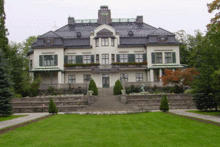

Villa Otium
Norway US embassy residence- The term cum dignitate otium ("leisure with dignity")[63] is found in Cicero's writings and refers to an aim and purpose of the Optimates.[64]
- Leisure without literature is death and burial for a living man. – a quote from Seneca the Younger.[65]
- Leisure is a system of symbols which acts to establish a feeling of freedom and pleasure by formulating a sense of choice and desire.[66]
- Mr. Morgan was enjoying his otium in a dignified manner, surveying the evening fog, and smoking a cigar ...[67]
- The Art nouveau or Jugendstyle residence of the United States Ambassador to Norway is called the Villa Otium.[68][D]
Synonyms
Otium carried with it many different meanings (including but not limited to time, chance, opportunity), depending on the time period or the philosophers involved in determining the concept.[69]
Positive sense
Synonyms of positive connotations are:
- quies - rest, repose, relief from toil.[69]
- requies - rest, repose, rest from labor, a hobby.[69]
- tranquilitas - tranquility, calm, quiet.[69]
- peace - as a state or condition of freedom from external enemies.[70]
- pax - to pacify or appease, as the outcome of diplomatic conference and agreement with an enemy.[70]
Negative sense
Synonyms of negative connotations are:
- inhonestum otium - dishonorable leisure, idle self-indulgence leisure.[61]
- desidia - slackness, idleness.[69]
- inertia - sloth, idleness, indolence.[69]
- ignavia - sloth, idleness, faint-heartedness.[69]
- desidiosissimum otium - a sluggard's free time, he that fears labor; a man careless to attend to his duty first.[71]
Bibliography
Footnotes
- ^ Aulus Gellius, Noctes Atticae, 19, 10. For this fragment as the first instance of otium in the extant literature, see Eleanor Winsor Leach, "Otium as Luxuria: Economy of Status in the Younger Pliny's Letters," Arethusa 36 (2003), p. 148.
- ^ Nietzsche, Memchliches, Allzumemchlzches. 1.284, 'Zu Gunsten der Mussigen', in Friedrich Nietzsche, Samtlzche Werke, ed. G. Colli and M. Montinari (15 vols, Berlin, 1967) ) II (1967). 132.
- ^ HUMAN, ALL TOO HUMAN, 'A Book For Free Spirits' Part I (1914), by Friedrich Nietzsche, translated by Helen Zimmern, FIFTH DIVISION - The Signs of Higher and Lower Culture, IN FAVOUR OF THE IDLE: As a sign that the value of a contemplative life has decreased, scholars now vie with active people in a sort of hurried enjoyment, so that they appear to value this mode of enjoying more than that which really pertains to them, and which, as a matter of fact, is a far greater enjoyment Scholars are ashamed of otium. But there is one noble thing about idleness and idlers. If idleness is really the beginning of all vice, it finds itself, therefore, at least in near neighbourhood of all the virtues ; the idle man is still a better man than the active. You do not suppose that in speaking of idleness and idlers I am alluding to you, you sluggards?
- ^ By Norwegian architect Henrik Bull. The building was inspired by Russian architecture, and was built for Hans Andreas Olsen, who had encountered it when he was the Consul General for Norway at St. Petersburg, Russia with his wife Ester, the niece of Alfred Nobel. "Ambassador’s Residence in Oslo; "Villa Otium"". U.S. Department of State. http://norway.usembassy.gov/cmr.html. Retrieved 9 November 2011.
Endnotes
- ^ a b c d e f Bondanella, Julia Conaway (2008). "Petrarch's Rereading of Otium in De vita solitaria". Comparative Literature (American Comparative Literature Association) 60 (1): 14–28. http://pages.uoregon.edu/clj/BondanellaAbstract.html. Retrieved 9 November 2011.
- ^ Garrison, p. 282
- ^ Walton, John K. (October 30, 2005). Histories of tourism: representation, identity and conflict. Multilingual Matters. pp. 71. ISBN 978-1845410315.
- ^ Scholl, Bell, Edith, David N. (FRW) (December 2009). Words for the Journey: A Monastic Vocabulary. Cistercian Publications. pp. 47. ISBN 978-0879070212.
- ^ Lewis and Short, "Otium"; Oxford Latin Dictionary; "Otium"
- ^ "Leisure and idleness in the Renaissance: the ambivalence of otium" by Brian Vickers; schole was itself to cevelop a negative sense in authors under the Roman Empire, like Plutarch.
- ^ a b Adler, pp. 86-87
- ^ a b Wirszubski, Chaim (1954). "Cicero's CVM Dignitate Otivm: A Reconsideration". The Journal of Roman Studies 44: 1–13. JSTOR 637589.
- ^ "Motto". p. 153-154. http://books.google.com/books?id=dThswCenaJ0C&printsec=frontcover&dq=Motto,+Anna+Lydia+(1999).+Veritatis+amicitiaeque+causa&hl=en#v=onepage&q=otium&f=false. Retrieved 9 November 2011.
- ^ Haase, p. 2265
- ^ Dillon, p.48
- ^ Rosenmeyer, p. 65
- ^ Dillion, p. 48
- ^ T. Maccius Plautus, Mercator (3.2)
- ^ AUCTORITAS, DIGNITAS, OTIUM
- ^ Stroup, p. 61
- ^ Prosperetti, p. 47
- ^ Wirszubski, pp. 93–94
- ^ Harbottle, p. 36
- ^ Cicero, De Oratore, Book ii. 13.57
- ^ Cicero, De Oratore, Book iii.15.57
- ^ Colish, pp. 77-78 Cicero on "otium"... Bringmann presents a view of Cicero in which his unwavering sense of duty ... can all be accommodated without the need to depict him as a mediocrity, a hypocrite, or a schizophrenic. (Klaus Bringmann - Untersuchungen zum spaten Cicero (pages 229-232) - Göttingen 1971)
- ^ Cicero, off. 3.1; Brut. 7–9
- ^ Cicero, Tusc. 1.5; 5.105; fam 1.9.21
- ^ Sallust, Cat. 3–4
- ^ "Leisure and idleness in the Renaissance: the ambivalence of otium" by Brian Vickers, p. 7
- ^ Beck, p. 42
- ^ Bereday, p. 60 & 156
- ^ Vasaly, p. 235
- ^ Stroup, p. 61
- ^ Stroup, p. 55
- ^ "The pursuit of leisure and the rise of the Roman villa". The New York Times. http://www.nytimes.com/2008/09/12/arts/12iht-otium.1.16069552.html?pagewanted=all. Retrieved 13 November 2011.
- ^ Frazer, p. 86
- ^ Statius, Silvae 3.5.85-87
- ^ The Roman Villa
- ^ Cairns, p. 146
- ^ Bright, p. 217
- ^ Myers, p. 73
- ^ Lee-Stecum, p. 265
- ^ Trapp, pp. 220–221
- ^ Cancik, p. 69
- ^ Seneca, De otio, De brevitate vitae, De tranquillitate animi, ep. 82.3
- ^ Pliny, epp. 1.22; 9.3
- ^ Horace, epod. 2
- ^ Vergil, g. 2.475–540
- ^ Tacitus, dial. 13
- ^ Erskine, p. 68
- ^ Motto, p. 161
- ^ Cavadini, p. 618
- ^ Ferguson, p. 208
- ^ Hilary, Trin. 1.1–2
- ^ Paulinus of Nola, ep. 5.4; carm. 10.166
- ^ Augustine. Enarrations on the Psalms. p. 220.3. http://www9.georgetown.edu/faculty/jod/augustine/textstrans.html. Retrieved 9 November 2011.
- ^ Prosperetti, p. 48
- ^ Beck, pp. 43-44
- ^ Kleist, p. 136
- ^ Maggi, p. 202
- ^ Vickers, Brian (March 1990. Article first published online: 29 August 2008). Leisure and Idleness in the Renaissance: the ambivalence of otium. 4 (1). The Society for Renaissance Studies (John Wiley & Sons. p. 1–37. doi:10.1111/j.1477-4658.1990.tb00408.x. http://onlinelibrary.wiley.com/doi/10.1111/j.1477-4658.1990.tb00408.x/abstract. Retrieved 9 November 2011.; page 5
- ^ The Garden by Andrew Marvell
- ^ Vickers, Brian (March 1990. Article first published online: 29 August 2008). Leisure and Idleness in the Renaissance: the ambivalence of otium. 4 (1). The Society for Renaissance Studies (John Wiley & Sons. p. 1–37. doi:10.1111/j.1477-4658.1990.tb00408.x. http://onlinelibrary.wiley.com/doi/10.1111/j.1477-4658.1990.tb00408.x/abstract. Retrieved 14 November 2011.; page 1
- ^ a b c d Balsdon, J. P. V. D. (May 1960). Auctoritas, Dignitas, Otium. 10 (1). Cambridge University Press on behalf of The Classical Association. p. 43-50. http://www.jstor.org/stable/637589. Retrieved 16 November 2011.; page 47
- ^ Cicero Pro Sestio 98; cf. 137
- ^ "Look up: Otium Cum Dignitate". Encyclo on line encyclopedia. http://www.encyclo.co.uk/define/Otium%20Cum%20Dignitate. Retrieved 9 November 2011.
- ^ Nietzsche, p. 46
- ^ ""Otium sine litteris mors est et hominis vivi sepultur" — Bestiaria Latina: Audio Latin Proverbs". University of Oklahoma. 2 July 2007. http://audiolatinproverbs.blogspot.com/2007/07/otium-sine-sine-litteris-mors-est-et.html. Retrieved 9 November 2011.
- ^ Toner, p. 17
- ^ Thackeray, p. 349
- ^ "Ambassador’s Residence in Oslo; "Villa Otium"". U.S. Department of State. http://norway.usembassy.gov/cmr.html. Retrieved 9 November 2011.
- ^ a b c d e f g Sadlek, p. 33
- ^ Cite error: Invalid
<ref>tag; no text was provided for refs namedMaclardy195; see Help:Cite errors/Cite error references no text - ^ Dumesnil, p. 224
References
- Adler, Mortimer J. (Oct 19, 2010). How to think about the great ideas: from the great books of western civilization. ReadHowYouWant.com. pp. 500. ISBN 1458720063.,
- Armstrong, David (2004). Vergil, Philodemus, and the Augustans. Austin, Texas: University of Texas Press. ISBN 0-292-70181-0.
- Beck, Thomas E. (2011). La Villa By Bartolomeo Taegio. Philadelphia, Pennsylvania: University of Pennsylvania Press. ISBN 081224317X.
- Bereday, George Z. F. (2006). World Yearbook of Education 1965: The Education Explosion. AnnArbor, Michigan: Taylor & Francis US. ISBN 0415392861.
- Bright, David F. (1978). Haec mihi fingebam: Tibullus in his world. Leiden New York: Brill. ISBN 9004056580.
- Cairns, Francis (1979). Tibullus, a Hellenistic poet at Rome. Cambridge Eng.; New York: CUP Archive. ISBN 0521296838.
- Cancik, Hubert (2008). Brill's New Pauly: encyclopaedia of the ancient world. 13. Leiden New York: Brill. ISBN 90-04-12259-1.
- Cavadini, John C. (1999). Augustine through the ages: an encyclopedia. Grand Rapids, Michigan: William B. Eerdmans Publishing Company. ISBN 0-8028-3843-X.
- Colish, Marcia L. (1985). The Stoic tradition from antiquity to the early middle ages: Stoicism in classical Latin literature. Leiden New York: Brill. ISBN 90-04-09330-3.
- Dillon, Sheila (2006). Ancient Greek portrait sculpture: contexts, subjects, and styles. Cambridge, UK; New York: Cambridge University Press. ISBN 0-521-85498-9.
- Dumesnil, Jean B. G. (1809). Latin synonyms, with their different significations: and examples taken from the best Latin authors. Cambridge, UK; New York: G.B. Whittaker.
- Ehrlich, Eugene H. (1995). Veni vidi vici: conquer your enemies, impress your friends with everyday Latin. Harper Collins. ISBN 0-06-273365-6.
- Erskine, Andrew (1990). The Hellenistic Stoa: political thought and action. London: Duckworth. ISBN 0715623265.
- Ferguson, Everett (1999). Christianity in relation to Jews, Greeks, and Romans. New York: Taylor & Francis;Garland Publishing. ISBN 0-8153-3069-3.
- Frazer, Alfred (1998). The Roman villa: villa urbana. Philadelphia: UPenn Museum of Archaeology. ISBN 0924171596.
- Garrison, Daniel H. (1998). Horace: Epodes and Odes. Norman, Oklahoma: University of Oklahoma Press. ISBN 0-8061-3057-1.
- Grijp, Paul van der (2009). Passion and profit: towards an anthropology of collecting. California: University of California. ISBN 3825892581.
- Haase, Wolfgang (1990). Philosophie (Epikureismus, Skeptizismus, Kynismus, Orphica, Doxographica), Volume 2; Volume 34; Volume 36. London: Walter de Gruyter. ISBN 3110124416.
- Harbottle, Thomas Benfield (1906). Dictionary of quotations (classical). S. Sonnenschein & Co., Limited. http://www.archive.org/details/dictionaryquota02harbgoog.
- Kronenberg, Leah (2009). Allegories of farming from Greece and Rome: philosophical satire in Xenophon, Varro and Virgil. Cambridge, UK; New York: Cambridge University Press. ISBN 0-521-51726-5.
- Kleist, Edward Eugene (2001). Judging Appearances. New York: Springer. ISBN 1402002580.
- Lassaigne, Jacques (1955). The fifteenth century: from Van Eyck to Botticelli. Ann Arbor, Michigan: University of Michigan / Skira.
- Lee-Stecum, Parshia (1998). Powerplay in Tibullus: reading Elegies book one. Cambridge, UK; New York: Cambridge University Press. ISBN 0521630835.
- Maclardy, Archibald A.; Cicero, Marcus Tullius (1902). The first oration of Cicero against Cataline: being the Latin text .... Hinds & Noble. http://www.archive.org/details/firstorationcic00cicegoog.
- Maggi, Armando (2009). Petrarch: a critical guide to the complete works. Chicago: University of Chicago Press. ISBN 0-226-43741-8.
- Merton, Thomas (1960). Spiritual direction and meditation. Collegeville, Minn: Liturgical Press. ISBN 0-8146-0412-9.
- Moore, Hugh (1831). A dictionary of quotations from various authors in ancient and modern languages, with English translations. Whittaker, Treacher, & Co. http://www.archive.org/details/dictionaryofquot00moorrich.
- Motto, Anna Lydia; Clark, John R.; Byrne, Shannon N. (1999). Veritatis amicitiaeque causa. 5. Wauconda, Ill: Bolchazy-Carducci Publishers. ISBN 0-86516-454-1. http://books.google.com/books?id=dThswCenaJ0C&printsec=frontcover&dq=Motto,+Anna+Lydia+(1999).+Veritatis+amicitiaeque+causa&hl=en#v=onepage&q=otium&f=false.
- Myers, Micah Young (2008). The frontiers of the empire and the edges of the world in the Augustan poetic imaginary. ProQuest. ISBN 0549846875.
- Nietzsche, Friedrich (1990). Unmodern observations. Yale University Press. ISBN 0-300-04311-2. http://www.cairnsweb.net/msfile/unmodern-observations-nietzsche/.
- Prosperetti, Leopoldine van Hogendorp, Landscape and philosophy in the art of Jan Brueghel the Elder (1568–1625) (2009). Farnham, England; Burlington, Vermont: Ashgate Publishing Ltd. ISBN 0-7546-6090-7.
- Rosenmeyer, Thomas G. (1973). The green cabinet: Theocritus and the European pastoral lyric. Berkeley: University of California Press. ISBN 0-520-02362-5.
- Sadlek, Georgy M. (2004). Idleness working: the discourse of love's labor from Ovid through Chaucer and Gower. New York: CUA Press. ISBN 0813213738.
- Stone, Jon R. (2005). The Routledge dictionary of Latin quotations: the illiterati's guide to Latin maxims, mottoes, proverbs and sayings. New York: Psychology Press. ISBN 0-415-96909-3.
- Stroup, Sarah Culpepper (2010). Catullus, Cicero, and a society of patrons: the generation of the text. Cambridge; New York: Cambridge University Press. ISBN 0-521-51390-1.
- Thackeray, William Makepeace (1858). The history of Pendennis: his fortunes and misfortunes, his friends and his greatest enemy. 2. Smith, Elder & Co. http://www.gutenberg.org/ebooks/9904.
- Toner, J. P. (1995). Leisure and ancient Rome. Cambridge England; Cambridge, MA: Polity Press; Wiley-Blackwell. ISBN 0-7456-1432-9.
- Trapp, Michael B. (2007). Philosophy in the Roman Empire: ethics, politics and society. Hampshire, England; Burlington, Vermnt: Ashgate Publishing, Ltd.; Aldershot. ISBN 0-7546-1618-5.
- Veblen, Thorstein (2007). The Theory of the Leisure Class. Cosimo, Inc. ISBN 1-60206-180-7. Downloadable edition at Project Gutenberg.
- Vasaly, Ann (1996). Representations: images of the world in Ciceronian oratory. Berkeley, California: University of California Press. ISBN 0520201787.
- Vickers, Brian (March 1990. Article first published online: 29 August 2008). Leisure and Idleness in the Renaissance: the ambivalence of otium. 4 (1). The Society for Renaissance Studies (John Wiley & Sons. p. 1–37. doi:10.1111/j.1477-4658.1990.tb00408.x. http://onlinelibrary.wiley.com/doi/10.1111/j.1477-4658.1990.tb00408.x/abstract. Retrieved 9 November 2011.
- Wirszubski, Chaim (1950). Libertas as a Political Idea at Rome During the Late Republic and Early Principate. Cambridge, United Kingdom; New York: Cambridge University Press. ISBN 0-521-06848-7.
- World Book Inc (2003). The World Book Dictionary. Chicago: World Book. ISBN 0-7166-0299-7.
Further reading
- Carr, Arthur (1896). General epistle of St. James. Cambridge University Press. http://www.archive.org/details/generalepistles01carrgoog.
- Kusch, Martin (2000). The sociology of philosophical knowledge. Dordrecht Boston: Springer;Kluwer Academic Publishers. ISBN 0-7923-6150-4.
See also
- Italian Renaissance garden
External links
- Hellenistic Philosophy
- Ode II-XVI “Otium” — Horace
Categories:- Ancient Roman virtues
- Epicureanism
- Hellenistic philosophy
- Roman era philosophy
- Latin legal terms
- Latin words and phrases
- Leisure
- Philosophy of law
- Political philosophy
- Roman law
- Stoicism
Wikimedia Foundation. 2010.

